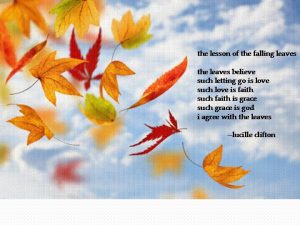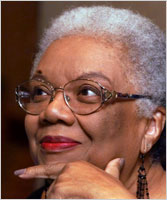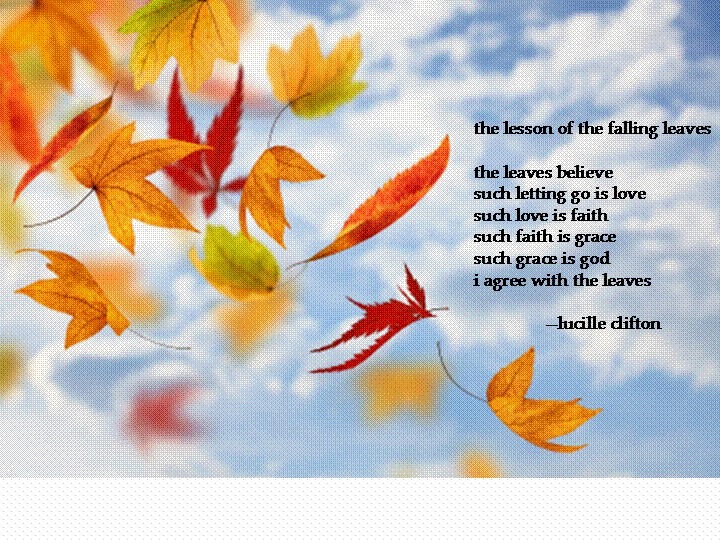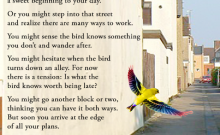 Today is the anniversary of Lucille Clifton’s birthday. She was a remarkable woman and poet. Though she is no longer with us, her poetry still speaks to us.
Today is the anniversary of Lucille Clifton’s birthday. She was a remarkable woman and poet. Though she is no longer with us, her poetry still speaks to us.
Throughout the “Week of Lucille Clifton” — we will post her poems and reflections on her poetry, her presence and the impact she had on the lives of those who knew her.
“Lucille Clifton’s life, like her poetry, was a model of confronting what is – straight on – and learning to dwell not in the sorrow that is, or even in the sorrow that will surely come, but rather in the possibilities that truth itself redeems, that always there is hope. Her belief in the human heart was strong, and while she was always wary of the complexity of that heart — its potential for evil as well as its promise — she never faltered in her desire that her students find for themselves a way to experience the full possibilities of their education.” — Michael Glaser
 Lucille Clifton was one of the most outstanding and beloved poets of her time. Winner of the National Book Award for Poetry and the Ruth Lilly Poetry Prize for lifetime achievement, she received many additional honors for her writing beginning with the Discovery Award from the , New York YW-YMHA Poetry Center in 1969 and including a 1976 Emmy Award as one of the writers for “Free to Be You and Me,” a Lannan Literary Award in 1994, and the Robert Frost Medal in 2010.
Lucille Clifton was one of the most outstanding and beloved poets of her time. Winner of the National Book Award for Poetry and the Ruth Lilly Poetry Prize for lifetime achievement, she received many additional honors for her writing beginning with the Discovery Award from the , New York YW-YMHA Poetry Center in 1969 and including a 1976 Emmy Award as one of the writers for “Free to Be You and Me,” a Lannan Literary Award in 1994, and the Robert Frost Medal in 2010.
She was named a Literary Lion by the New York Public Library in 1996 and served as a Chancellor of the Academy of American Poets (1999-2005) and was elected a fellow in Literature of the American Academy of Arts and Sciences. She was the first author to have two books of poetry chosen as finalists for the Pulitzer Prize in the same year (1987 for Good Woman and Next). She also wrote children’s books and received the Coretta Scott King Award, from the American Library Association for in Everett Anderson’s Good-bye (1984).
Born near Buffalo in Depew, New York Lucille lived in New York from 1936-1967 when she moved to Baltimore. She was appointed Maryland’s Poet Laureate in 1974 and remained in that post for eleven years, until she moved to Santa Cruz in 1985. She returned to Maryland in 1989.
Lucille taught at numerous colleges and universities including the University of California at Santa Cruz (1984-1989), Memphis State University (1994-1995) Duke University where she served for several terms as the William Blackburn Distinguished Visiting Professor at Duke University (, 1998, 1999)) Dartmouth College (2007). Beginning in 1989, Lucille taught at St. Mary’s College of Maryland. She served as Distinguished Professor of Humanities at St. Mary’s until her retirement in 2006. She was inducted into Phi Beta Kappa and received seven honorary doctorate degrees. In 1958, Lucille married the philosopher, Fred Clifton. They had six children, each of whom she treasured with a proud and deep commitment to mothering: Sidney, Frederica, Gillian, Alexia, Channing and Graham.
Lucille Clifton’s integrity and moral voice about matters in our individual and communal lives served many as a beacon of courage and compassion. Her poems, forged from experience, emotion and a fierce, truth-telling intellect, focus on the human struggle for dignity, justice and freedom. As the citation from the National Book Awards so accurately asserts, her poems, “fueled by emotional necessity. . . [achieve] such clarity and power that her vision becomes representative, communal, and unforgettable.” Lucille, in her life and in her poetry, dwelt in the possibilities that truth redeems, that always there is hope. Her poetry engages its reader with the deeper and more complex truths of our lives, and it does so with such clarity that even the radical ambiguity within which we live seems filled with light.
Lucille’s great courage and strength shine through her poems. Even when she wrote about personally difficult subject matter, she approached the world with infinite interest and tenderness toward the mystery of all that lives. It saddened her that her work was rarely also recognized for its craft – its precision and accuracy of language, its attention to both musicality and theater, its careful attention to syntax and rhythm, shade and tone. Nonetheless, she was most treasured because she found words for all of us. “Sometimes, as Wayne Karlin has written, “you could hear the fury trembling under them, and sometimes the sadness, and many times you could hear the laughter. She turned it all into beauty.”
As she wrote at the end of her prose memoir, Generations:
“And I could tell you about things we been through, some awful ones, some wonderful, but I know that the things that make us are more than that, our lives are more than the days in them, our lives are our line and we go on….”
— Michael Glaser.
Michael Glaser served as Poet Laureate of Maryland from 2004 – 2009. He is a Professor Emeritus at St. Mary’s College of Maryland where he served as both a professor of English and an administrator for nearly 40 years. In addition to his own poetry books, Glaser edited Come Celebrate with Me, a memorial tribute to Lucille Clifton (2011). He also served as co-editor, with Kevin Young, of the prize winning Collected Poems of Lucille Clifton (BOA, 2012).







Leave a Comment